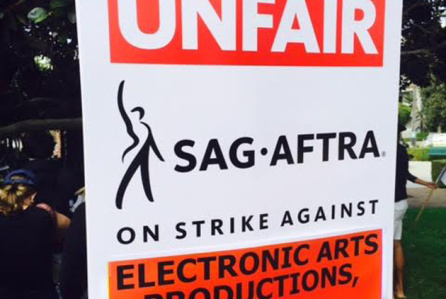The videogame voice actors strike is officially over
SAG-AFTRA has voted 90 percent in favor of the deal that was reached in September.

The videogame voice actors strike that began more than a year ago is finally over. SAG-AFTRA, the union representing the voice actors, has announced that its members voted "overwhelmingly" in favor of the tentative agreement that was reached in September.
Based on what SAG-AFTRA said last year were the two primary sticking points that led to the strike—transparency and secondary compensation—the new deal appears to be a victory for the union. It establishes a new bonus structure for performers based on the number of sessions worked, as well as "transparency provisions" that will require the disclosure of a project's code name, genre, whether or not it's based on established IP, and if an existing role is being reprised.
Game makers must also reveal in advance whether the performance will require the use of "unusual terminology, profanity or racial slurs," feature sexual or violent content, or require the performance of stunts. The industry has also agreed to "continue working with SAG-AFTRA on the issue of vocal stress during the term of the agreement."
"This agreement is the first step towards streamlining the work our members do in the video game industry," SAG-AFTRA president Gabrielle Carteris said. "The deal includes significant improvements in the area of transparency and the payment structure ensures that our members are compensated fairly for their work. I am excited for what this means for our members moving forward."
The union also noted that the new deal omits proposals desired by game companies, including one that would have seen performers fined for being late or distracted at recording sessions, and another that "would have allowed employers to use their permanent staff to do covered work outside of the collective bargaining agreement."
The new deal will take effect on November 8, and is set to expire on November 7, 2020.
Keep up to date with the most important stories and the best deals, as picked by the PC Gamer team.

Andy has been gaming on PCs from the very beginning, starting as a youngster with text adventures and primitive action games on a cassette-based TRS80. From there he graduated to the glory days of Sierra Online adventures and Microprose sims, ran a local BBS, learned how to build PCs, and developed a longstanding love of RPGs, immersive sims, and shooters. He began writing videogame news in 2007 for The Escapist and somehow managed to avoid getting fired until 2014, when he joined the storied ranks of PC Gamer. He covers all aspects of the industry, from new game announcements and patch notes to legal disputes, Twitch beefs, esports, and Henry Cavill. Lots of Henry Cavill.

